Behind UMC’s Lenient Sentence in Trade Secrets Case
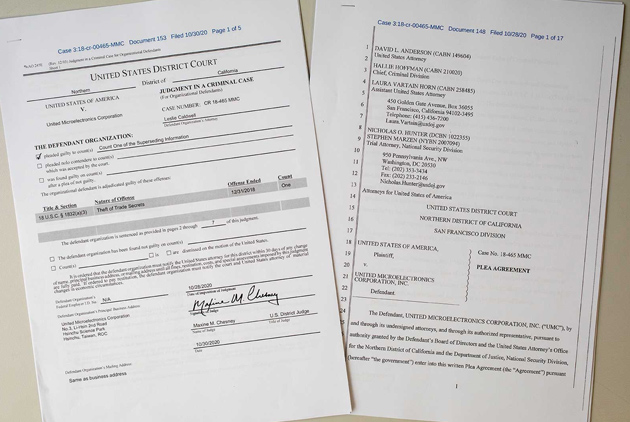
Source:Chien-Ying Chiu
CommonWealth Magazine listened in to the sentencing of United Microelectronics Corp. in California after it pleaded guilty to stealing trade secrets. UMC’s lawyer said the company received a lighter-than-expected penalty – a US$60 million fine – because it has agreed to be a “snitch” for U.S. prosecutors.
Views
Behind UMC’s Lenient Sentence in Trade Secrets Case
By Hannah Changweb only
After almost two years of litigation, a case brought by the United States government against Taiwan-based contract chipmaker United Microelectronics Corp. (UMC) was decided on Oct. 29.
In November 2018, the U.S. Department of Justice (DOJ) indicted UMC and some of its employees on charges of violating Protection of Trade Secrets clauses under the U.S. criminal code. Prosecutors alleged they stole trade secrets from U.S.-based semiconductor vendor Micron Technology to help Chinese state-owned company Fujian Jinhua Integrated Circuit develop memory chip technology.
UMC lawyer Leslie Caldwell, Micron lawyer Neal Stephens, and Assistant United States Attorney Laura Vartain Horn in the United States and UMC General Counsel Lucas Chang and a CommonWealth reporter in Taiwan participated in a Zoom call held by the Northern District of California District Court for the sentencing of UMC.
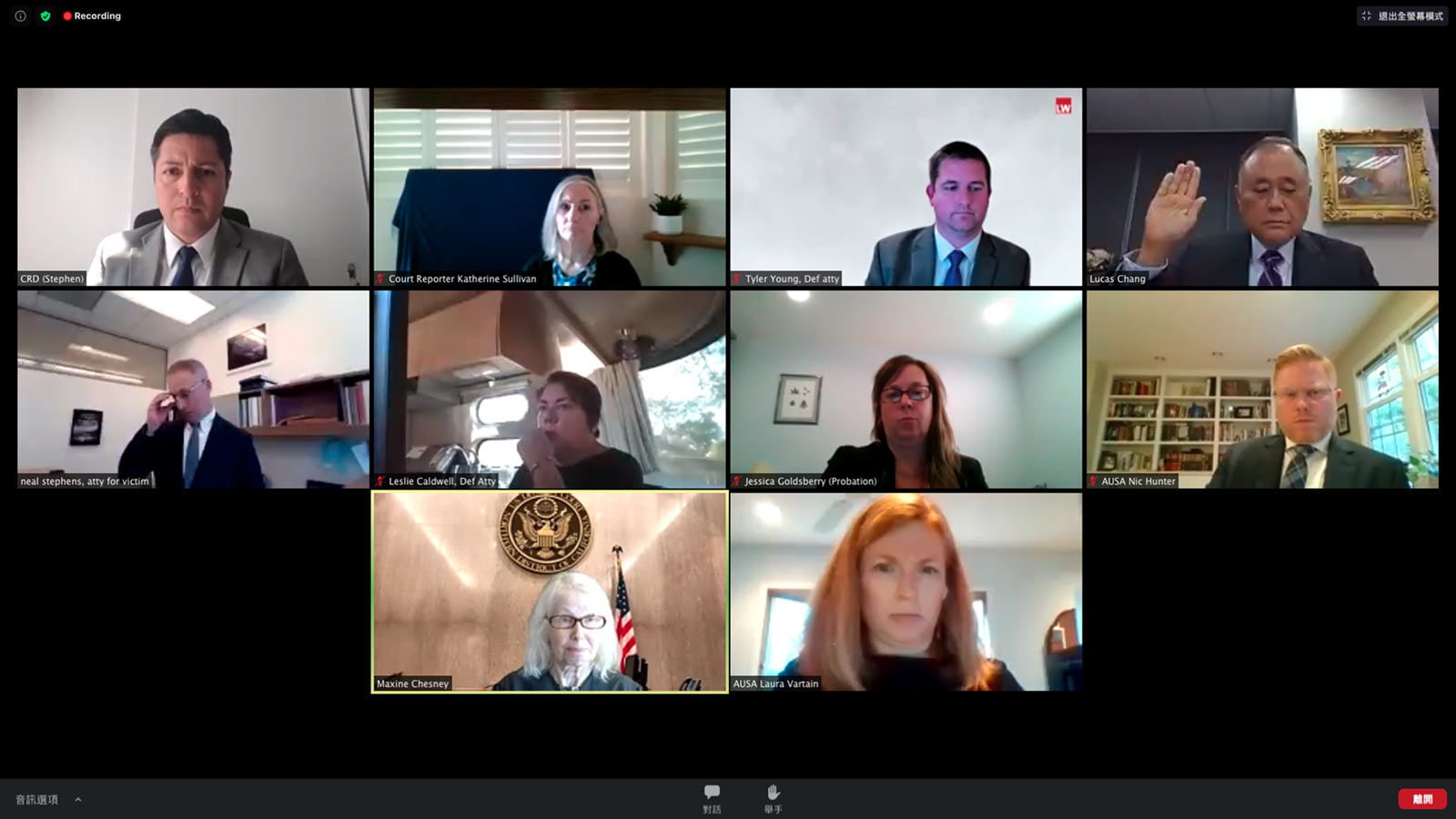
The allegation is that “UMC violated title 18 in the United States code section 1832 a3 [18 U.S.C. § 1832(a)(3)], briefly described as Theft of Trade Secrets,” said Federal Judge Maxine M. Chesney, who was presiding over the case.
“The fine range going along with that would be US$42 million to US$ 84 million. [Under the plea agreement], they say that they have selected a mid-range fine of US$60 million.”
The U.S. DOJ then issued a statement saying UMC “pleaded guilty to criminal trade secret theft and was sentenced to pay a US$60 million fine, in exchange for its agreement to cooperate with the government in the investigation and prosecution of its co-defendant, a Chinese state-owned enterprise.” That enterprise is Fujian Jinhua.
Many people in the industry and legal analysts immediately figured that UMC had agreed to turn state’s witness and testify that its client – Fujian Jinhua – stole secrets related to Micron’s DRAM production processes.
“That’s misleading,” Chang says, protesting such an interpretation. “UMC’s Xiamen plant has a capacity of 10,000 wafers a month. How could I cooperate with the United States in containing China to go after a Chinese state-run enterprise?
So what is the truth? A CommonWealth reporter was given exclusive access to the Oct. 29 sentencing hearing, and one part of the conversation was revealing on this issue.
Judge Chesney asked Jessica Goldsberry, an officer with the United States Probation Office: “A judgment will have to be prepared by U.S. probation. Do you need clarification or assistance in that regard at this time? Do you have anything to add?”
Goldsberry responded: “The defendant will cooperate with the United States pursuant to the provisions of Paragraph nine of the plea agreement and shall conduct all of its operations in accordance with the laws of the United States and will make payments of all monetary amounts.”
UMC’s lawyer Leslie Caldwell asked Goldsberry to repeat that twice before responding, “UMC agrees with that.”
“All right. So ordered as a condition of probation,” Judge Chesney replied.
Goldsberry’s response was included verbatim in Additional Probation Terms included in the judgement signed by Judge Chesney on Oct. 30.
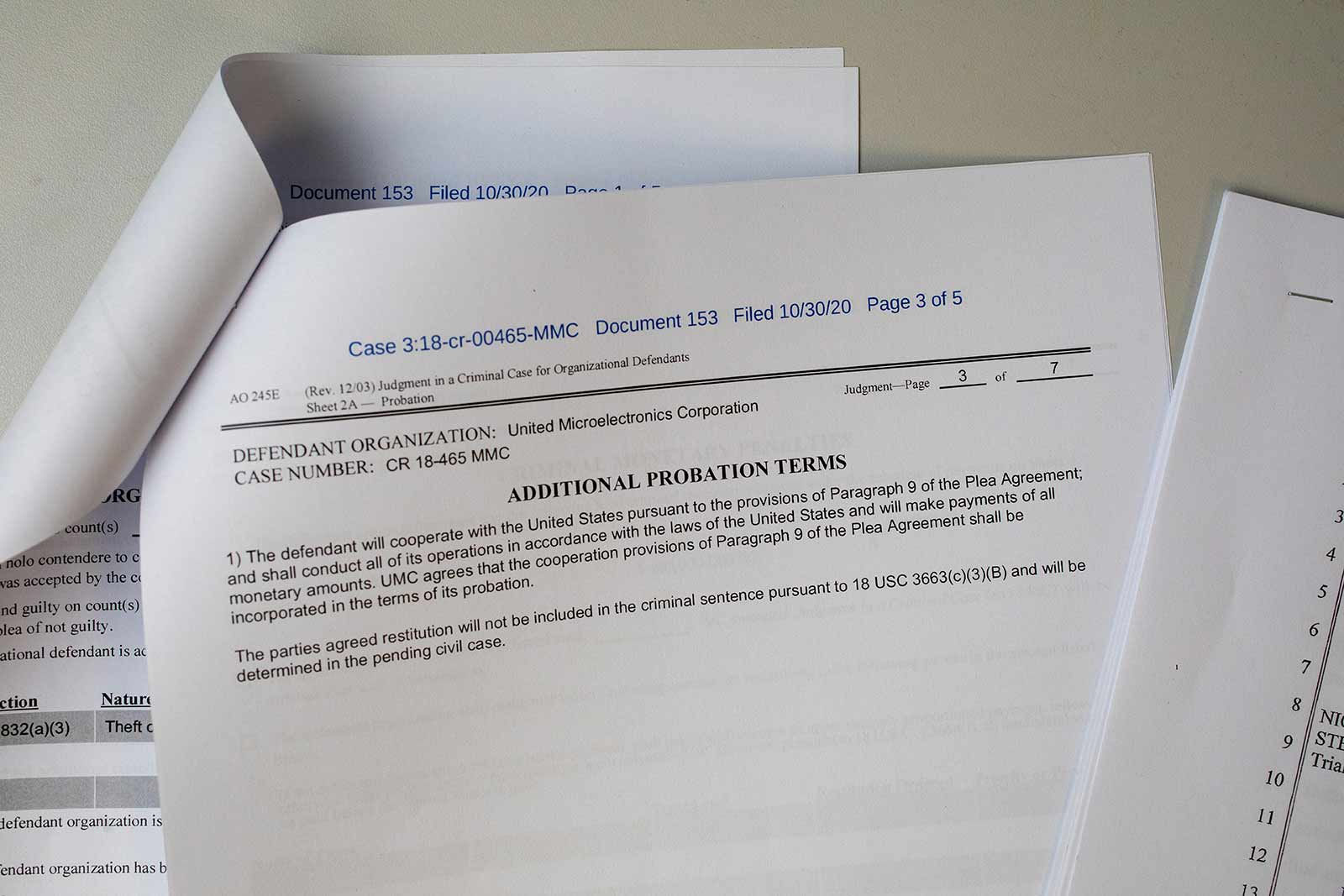
What were the specific conditions found in Paragraph 9 of the plea agreement?
CommonWealth obtained a copy of the plea agreement after the trial. After reading it, a senior partner with a major law firm in Taiwan said “the plea agreement was highly lethal [to UMC]!”
Paragraph 9 on page 11 of the plea agreement stipulates that UMC agrees to cooperate with the American government (including the U.S. Attorney’s Office and U.S. DOJ). It has five parts, and parts 9a, 9b and 9c cover the following:
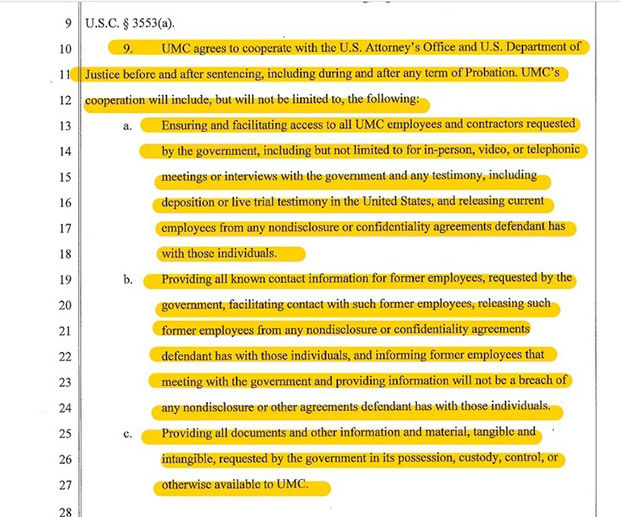
They say UMC should ensure access to all UMC employees and contractors requested by the government, whether by in-person, video or telephone meetings, for depositions or live trial testimony in the United States. The company must also provide contact information for former employees and all documents and other information requested by the government.
UMC General Counsel Chang, who was one of the people who signed the plea agreement, denied that there was a quid pro quo, saying that UMC will simply “provide what we should provide.”
It was only after reading through the whole plea agreement that the senior lawyer understood why UMC was able to get off with a US$60 million fine, a much more lenient penalty than was expected.
UMC did not explicitly admit in the plea deal that it was turning state’s witness for the DOJ, he said, but the conditions listed in Paragraph 9 with which UMC must comply require current employees, former employees, and the company to provide any documents they have related to Fujian Jinhua. Once these details are entered into testimony, they could help the DOJ prosecute the Chinese company.
“In fact, [UMC] you have to take everything you know and the degree to which Fujian Jinhua stole secrets and turn that over to the DOJ. To my mind, ‘cooperating [with the U.S. DOJ] to be a snitch,” he said.
Compared with the actual content of the plea deal, Lucas Chang’s description of UMC’s obligations to CommonWealth seem understated. “In the future, they [U.S. DOJ] can speak with our employees and ask us for documents. We will provide what we should provide, but you cannot translate that into saying that UMC is cooperating to get back at them [Fujian Jinhua],” he said.
Wang Wei-lin, the head of the Science & Technology Law Institute at the Institute for Information Industry, echoed UMC’s position, saying that viewed solely in terms of the conditions, UMC could still be described as “passively cooperating in providing information.”
The senior lawyer said, however, that a passage on page 2 of the plea agreement was also important: “UMC agrees that under the laws of the United States it is legally liable for the acts of its employees and thus is guilty of the offense and that the following facts are true.”
This implies recognition on the part of UMC that everything after page 2, including the theft of Micron trade secrets and the uploading of them to the cloud by former UMC employees and the cooperation between UMC and Fujian Jinhua is all true.
One engineer named Kenny Wang, who was a key player in this and a defendant in the case, left Micron for UMC in 2016. In a meeting in August 2016, Wang had a discussion with a UMC senior manager who was involved in developing UMC’s DRAM design rules. “Based on that meeting, Wang believed that the UMC senior manager wanted him to review and use any useful Micron design rule information to which he might have access,” the plea agreement reads.
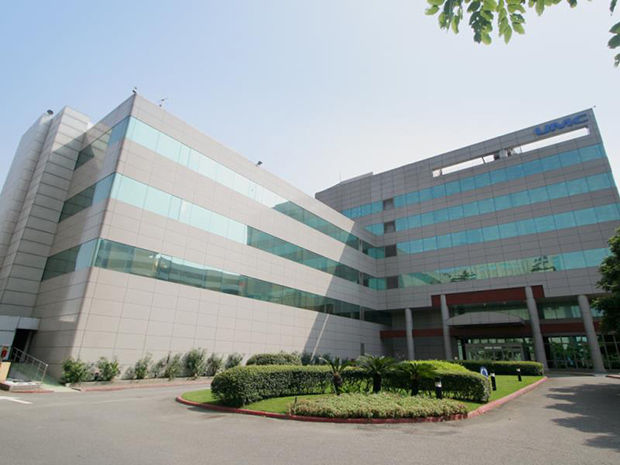
Given that behavior, the senior lawyer said UMC was able to get off with a lenient sentence only because “U.S. prosecutors want to use UMC to get more evidence, and therefore let this small fish go to catch the big fish.”
He surmised that the main reason UMC agreed to a plea agreement was because of the very high risk of criminal liability in the United States. UMC, he suggested, did “whatever it took to first avoid criminal risk so that top executives do not have to go to jail in the United States.”
Yet, UMC’s admittance to criminal behavior may come back to haunt it. UMC was found guilty of stealing trade secrets by the Taichung District Court in June 2020 and ordered to pay a penalty of NT$100 million.
UMC said it will appeal the decision, but the appeal would be heard by Taiwan’s Intellectual Property Court. If it refers to the California plea agreement, UMC may find it difficult to reverse the Taichung court’s ruling.
Have you read?
♦ Burned by Huawei Ban, Qualcomm Document Implicates MediaTek
♦ Taiwan’s Epidemic Prevention Technology: an Inside Look
♦ Taiwan Needs More than TSMC
Translated by Luke Sabatier
Uploaded by Penny Chiang






